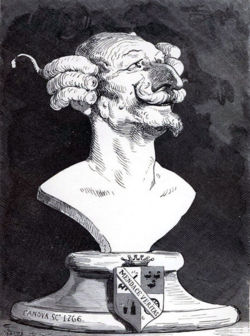Baron Munchausen: Difference between revisions
imported>Russell Potter (add date; copyedit) |
imported>Russell Potter (add image) |
||
| Line 1: | Line 1: | ||
(this article is about the fictitious character; for the "real" Baron Münchausen, see [[Karl Friedrich Hieronymus, Freiherr von Münchhausen]]). | (this article is about the fictitious character; for the "real" Baron Münchausen, see [[Karl Friedrich Hieronymus, Freiherr von Münchhausen]]). | ||
[[Image:446px-Dore-munchausen-illustration.jpg|thumb|right|250px|Depiction of Baron Münchausen by [[Gutsave Doré]], 1887]] | |||
'''Baron Münchausen''' is an enduring figure of comical exaggeration, originated by [[Rudolf Erich Raspé]] in a series of stories which were first published in the 1780's. Raspé himself may have borrowed the stories from others, and his own, regularly extended collections of stories were soon taken up and continued by later writers. Particularly in [[Germany]] and in Raspé's adopted homland of [[England]], the stories became immensely popular, and the name of Münchausen became almost a shorthand for any form of exaggerated story or "tall tale." In the twentieth century, the Baron was featured in films and animated cartoons, most notably in [[Terry Gilliam]]'s 1988 film [[The Adventures of Baron Münchausen (film)|The Adventures of Baron Münchausen]]. In medical literature,there exists a condition known as "[[Münchausen's Syndrome]]" involves people who narrate fictional symptoms to doctors in order to obtain attention and vindication. | '''Baron Münchausen''' is an enduring figure of comical exaggeration, originated by [[Rudolf Erich Raspé]] in a series of stories which were first published in the 1780's. Raspé himself may have borrowed the stories from others, and his own, regularly extended collections of stories were soon taken up and continued by later writers. Particularly in [[Germany]] and in Raspé's adopted homland of [[England]], the stories became immensely popular, and the name of Münchausen became almost a shorthand for any form of exaggerated story or "tall tale." In the twentieth century, the Baron was featured in films and animated cartoons, most notably in [[Terry Gilliam]]'s 1988 film [[The Adventures of Baron Münchausen (film)|The Adventures of Baron Münchausen]]. In medical literature,there exists a condition known as "[[Münchausen's Syndrome]]" involves people who narrate fictional symptoms to doctors in order to obtain attention and vindication. | ||
Revision as of 09:26, 29 May 2007
(this article is about the fictitious character; for the "real" Baron Münchausen, see Karl Friedrich Hieronymus, Freiherr von Münchhausen).

Baron Münchausen is an enduring figure of comical exaggeration, originated by Rudolf Erich Raspé in a series of stories which were first published in the 1780's. Raspé himself may have borrowed the stories from others, and his own, regularly extended collections of stories were soon taken up and continued by later writers. Particularly in Germany and in Raspé's adopted homland of England, the stories became immensely popular, and the name of Münchausen became almost a shorthand for any form of exaggerated story or "tall tale." In the twentieth century, the Baron was featured in films and animated cartoons, most notably in Terry Gilliam's 1988 film The Adventures of Baron Münchausen. In medical literature,there exists a condition known as "Münchausen's Syndrome" involves people who narrate fictional symptoms to doctors in order to obtain attention and vindication.